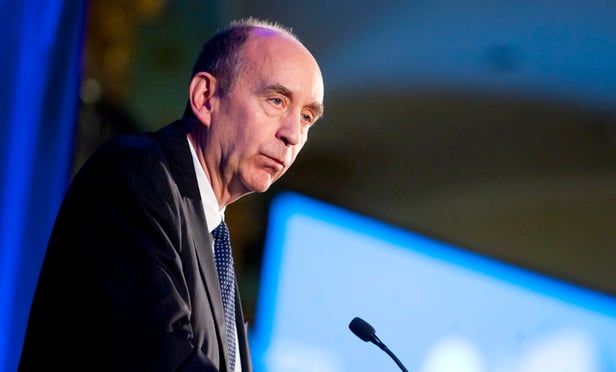 Former White House counsel W. Neil Eggleston. (Photo: Diego M. Radzinschi)
Former White House counsel W. Neil Eggleston. (Photo: Diego M. Radzinschi)
On Inauguration Day, outgoing White House counsel Neil Eggleston visited his office in the West Wing one last time. He then went to Andrews Air Force base to say goodbye to his boss, Barack Obama, before taking a call from a former Kirkland & Ellis colleague to schedule a dinner the following week.
Three months later, Eggleston has returned to private practice and to his old firm, Kirkland announced internally Monday.
Eggleston was a Kirkland partner from 2012 to 2014, before joining the Obama administration as the top White House lawyer. Earlier he was a partner at Debevoise & Plimpton and Howrey.
“From the moment Neil left, we were missing him and hoping he would return,” said Eugene Assaf, a Washington-based Kirkland partner who serves on the firm’s executive management committee and was the one who reached out on Jan. 20.
Eggleston said he didn’t really consider going to another firm. “They’re probably the highest-performing litigators I had ever worked with,” he said of Kirkland.
His last time in private practice, Eggleston advised boards and CEOs and took on investigations and other enforcement matters. In 2014, his Kirkland partnership share was worth $5.1 million, according to his federal financial disclosure.
This time, Eggleston, who is 63, plans to build a practice similar to what he had before, plus teach at Harvard Law School and keep a calendar of public appearances and speeches.
“Hopefully, I’ll ramp up quickly. I’ve had former clients reach out and ask me when I’ll be returning” to the firm, he said.
Kirkland’s profits per partner now average $4.1 million, about $600,000 more than in 2014, and some big-name laterals have joined the firm for upward of $9 million a year.
The partnership includes major deal lawyers and litigation rainmakers. There are also several high-ranking Republicans, such as former Deputy U.S. Attorney General Mark Filip and former U.S. Solicitor General Paul Clement, who joined the firm last year.
While he was in the White House, Eggleston and the Department of Homeland Security tapped Filip, who served at Justice during George W. Bush’s administration, for a four-person committee that reviewed Secret Service failures.
WHITE HOUSE LEGACY
Eggleston kept a somewhat lower political profile than the White House counsel who preceded him: Kathryn Ruemmler (now at Latham & Watkins), Robert Bauer (Perkins Coie) and Gregory Craig (now at Skadden, Arps, Slate, Meagher & Flom).
“I generally viewed when I started, that White House counsel should not have his or her name in the paper,” he said. “If the White House counsel’s name is in the paper a lot, it means something was going wrong at the White House.”
He declined to comment on his successor in the Trump White House, Donald McGahn, formerly of Jones Day.
Eggleston oversaw or advised on several major policy matters during his time in office. He singled out his role coordinating the Clemency Project, which began shortly before his first day in the office in 2014 and considered petitions from thousands of outside attorneys. The project ultimately led to Obama granting 1,700 prisoners commutations, often because they received harsh drug crime-related sentences.
Eggleston also recommended Judge Merrick Garland to fill the then-vacant U.S. Supreme Court seat. “The president had said to me after the death of Justice Scalia, ‘I want the best possible candidate to serve on the Supreme Court,’” Eggleston said. The outcome for Garland was “disappointing,” he added.
Also during Obama’s last two years, the White House counsel’s office played a role in dozens of executive actions, from environmental sustainability, to fair wages, to national security measures and cybersecurity. During Eggleston’s tenure, Obama issued more than 40 percent of his administration’s total executive actions.
Now, Eggleston may see several of his accomplishments voided by the Trump administration.
Attorney General Jeff Sessions opposed the Clemency Project, for instance, and the new administration has already changed some policies and will let others wither.
In immigration, courts blocked an Obama administration order to stop deportations of undocumented parents of U.S.-born citizens. Last week the government deported an immigrant who may have been covered by an earlier Obama policy for children who were brought to the U.S. illegally decades ago.
While the Obama administration stepped in to oversee police departments accused of racially motivated violence, Sessions’ Justice Department said it would review the federal consent decrees in police departments such as Baltimore’s. And the current Justice Department said it would keep open private prisons after the Obama administration attempted to close them.
Climate change is another subject on which the two White Houses differ.
“Elections have consequences. There are certain areas that I hope as the Trump administration continues to look at them, they’ll have a different perspective,” Eggleston said. “I hope [the administration] recognizes how important climate change is to the world.”
In particular, Eggleston cited Obama’s support of the 2016 Paris Agreement on climate change and the Clean Power Plan, which is being tested before the U.S. Court of Appeals for the D.C. Circuit.
Katelyn Polantz is based in Washington, D.C., and writes about government and the business of law. She can be reached at [email protected]. On Twitter: @kpolantz.




